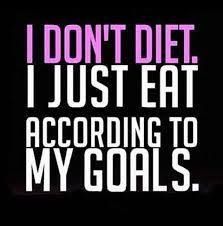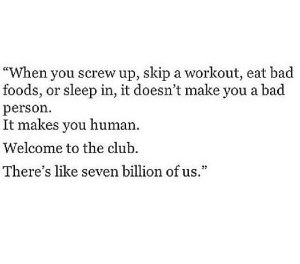Fad diets create zombies. There, I said it.
Diets tell you not to think for yourself or listen to your body — to simply “follow the rules” at all costs.
And, unfortunately, many diets just drain people, emotionally and physically. I think the quote, “I feel thin, sort of stretched, like butter scraped over too much bread” from Bilbo Baggins in The Fellowship of the Ring can be applied to many people who try the latest fad diet.
They’re hungry, and confused. Oftentimes they walk around in a zombie-like trance, but instead of drooling over the thought of “braaaaaaains” they dream about taking a bite of a sandwich, or piece of chocolate. Then again, some people are so famished they’d gladly gnaw on a chicken foot.
Many diets cause people to become robotic in their actions, disregarding any feedback from their body. They simply follow the rules at all costs, no matter what their body may say in return to these actions.
“I’m really exhausted, but at least I’m losing weight!” she exclaimed with enthusiasm. This came from a lady who is on one of the latest fad diets. She ate nothing but cabbage soup for the first few days, and every week she introduces only a few new foods into her diet.
Yes, that’s an extreme-diet example, but there are plenty of other individuals who, quite literally, revolve their life around a particular diet. It affects their social life and consumes so much mental energy from constantly thinking about, and preparing, “perfect meals” so they can stay on the plan. And, once again, these people are also hungry, and frustrated. (Look! A half-eaten chicken foot!).
We don’t have to trade energy, satiety, and happiness for weight loss.
- You don’t need to be confused from the conflicting nutrition information.
- You don’t have to go on the latest fad diet to be bikini-ready this summer.
- You don’t have to walk around starving or avoiding entire food groups.
- You don’t have to jump on the latest diet-bandwagon to lose weight quickly only to regain that weight, with interest.
Nutrition isn’t as complicated as many popular diets lead you to believe. Sure, it may take some time to adopt new habits and patterns, but you don’t need to follow rigid, stressful, and ultimately unsustainable “rules”. And, thankfully, there are some research studies (and heaps of real-world experience) to back up this claim.
For example, this article on nutrient timing from the amazing crew at Precision Nutrition busts numerous myths in regards to nutrition. Specifically, that article busts several myths.
- In regards to post-workout nutrition: “The total amount of protein and carbohydrate you eat, over the course of the day, is more important for body composition and performance than nutrient timing strategies”.
- In regards to meal scheduling: “What’s most important is you make high-quality choices, consistently, whenever it works for you”. (i.e. don’t force yourself to follow certain eating patterns — do what works for you and what fits your lifestyle and preferences).
- In regards to meal frequency: “As long as we eat the right foods in the right amounts, meal frequency seems to be a matter of personal preference”.
 The Bottom Line
The Bottom Line
It’s best to focus on the few, important things that produce the majority of the results and don’t cause you unnecessary stress. Stick to the basics and the details will fall in line with your preferences and lifestyle.
And Alan Aragon wrote a terrific article, The Dirt on Clean Eating, that discusses the problems with labeling foods as “clean” and largely reveals that, yes, moderation may be the best approach for not only fat loss, but a healthier long-term approach than the all-or-nothing method promoted by many diets and meal plans.
Another article — Science Compared Every Diet, and the Winner is Real Food – debuted recently that posed the question “if one diet could be crowned best in terms of health outcomes. If diet is a set of rigid principles, the answer is a decisive no. In terms of broader guidelines, it’s a decisive yes.”
This article also came to the conclusion that it’s best to focus on the basics and that,“Exaggerated emphasis on a single nutrient or food is inadvisable.”
And if you think about it, that’s how many fad diets operate. They blame all of our fat-problems on a food group (e.g. dairy, gluten, meat, etc) or a macronutrient (e.g. fat, carbs. And the team at Precision Nutrition also has a great article that clears up the carb controversy.).
But as the article revealed, there is no one thing to blame, and an attempt to do so could cause more harm than good.
 So, what does all of this mean for you?
So, what does all of this mean for you?
It means you can let go and stop stressing over the tiny details that don’t truly matter when it comes to nutrition.
- It means there’s no single food, food group, or macronutrient to blame for all of our problems, and there isn’t a magical combination either.
- It means we can break free from confusion and unnecessary stress caused by trying to find “the perfect diet” or meal plan.
- It means there’s not a one-size-fits all diet or meal plan that will work for everyone – basic nutrition guidelines allow for much needed individuality and produce long lasting sustainable habits.
- It means you don’t have to walk around starving and drooling over the thought of chicken feet (unless, of course, that’s your idea of a great meal.).
With love from the Trench kitchen,
xoxoErika


 So, what does all of this mean for you?
So, what does all of this mean for you?







